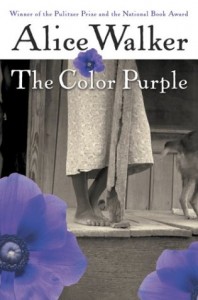The Color Purple
Historical Fiction
By Alice Walker
Reviewed by Moriah Teed
5 out of 5 stars
 Celie, a poor, African American girl in the 1920s, is abused and raped by her father at the early age of fourteen. She can not escape this tragic life and is too ashamed and frightened to tell anyone. God becomes the only one she can confide in, which she does through her written letters. In these letters, she tells of her struggles, first the distress caused by her father, then of the man she is forced to marry, who doesn’t love her. Her husband, “Mr. _____,” constantly tells her how ugly and worthless she is, all the while, refusing to work himself. It is now Celie’s responsibility to raise his rotten children, clean the house, and work the fields. To make matters worse, Mr. _____ proclaims that Celie will never see her sister Nettie again, the sole person that loved her in this world. The only thing that keeps Celie going is her letters to God.
Celie, a poor, African American girl in the 1920s, is abused and raped by her father at the early age of fourteen. She can not escape this tragic life and is too ashamed and frightened to tell anyone. God becomes the only one she can confide in, which she does through her written letters. In these letters, she tells of her struggles, first the distress caused by her father, then of the man she is forced to marry, who doesn’t love her. Her husband, “Mr. _____,” constantly tells her how ugly and worthless she is, all the while, refusing to work himself. It is now Celie’s responsibility to raise his rotten children, clean the house, and work the fields. To make matters worse, Mr. _____ proclaims that Celie will never see her sister Nettie again, the sole person that loved her in this world. The only thing that keeps Celie going is her letters to God.
Alice Walker’s award-winning novel, The Color Purple, is fantastic story of the bond of sisterhood, the voyage to self-worth, and the power of inner-strength. These concepts are evident in the individual characters, as well as in the relationships between them. The author uses a creative method to display these characters through Celie’s eyes, by writing the story in letter form — mainly Celie’s letters to God. Because of this writing style, the novel captures the reader’s heart more than a traditional story, written from an outsider’s perspective; it makes the story more relatable, personal, and honest.
It is amazing to watch each character develop and grow during the course of events and through time in general. Alice Walker did a wonderful job on making this story incredibly realistic. To make a story real though, the hard times must be told, not just the joyful experiences. Violence, cruelty, racism, sexism, and abuse are very present themes throughout the novel. Great ethical values and sometimes hidden truths can be learned from such concepts however, for instance, the idea that nothing is ever truly black and white. In life, there is never one, true “bad guy;” it is more complex than that. Although there may be no justification in one’s actions, there is usually a deeper motive that cannot always be seen instantly. Be forewarned, some of those “actions” are described in detail, but once again, Alice Walker did not sugar-coat anything. Plus, even though disturbing and dark realities are frequently portrayed, what is more important is the character’s rise above them. That rise is what makes The Color Purple so spectacular and inspirational. I would recommend it to anyone who wants a real, passionate, heart-wrenching novel.


